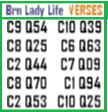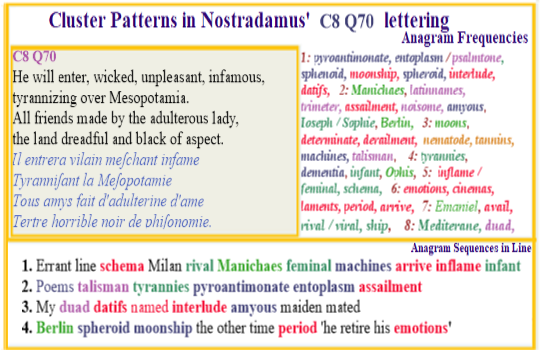 Analyses of all verses
Analyses of all verses
|
 Web Site
Web Site |
 All
Sefirots All
Sefirots |
Nostradamus C8 Q70: The tyrant invader hunts for members of the Jesus-clone sect
Copyright: Allan Webber, December 2015, Mar 2023

 Via
the third line of text in C8 Q70 saying All friends made by
the adulterous lady, this verse is linked to the quote from
the 1558 Henry Epistle shown alongside.
Via
the third line of text in C8 Q70 saying All friends made by
the adulterous lady, this verse is linked to the quote from
the 1558 Henry Epistle shown alongside.
In the quote the once barren lady has four children that survive and 'of these two will not have the same father'.
It is possible to achieve the stated different fatherhood result given in the quote through adultery, as well as by death of a succession of husbands.
So, given there is no tie linking the daughter to adultery or widow-hood in the quote the adulterous lady referenced in this verse is in all probability the 'once barren Lady'.
The text of the current verse provides clues as to the adulterous lady's part in the conception of the Jesus-clone however it also implies it is about those who hunt to destroy that child. The barren lay is probably the mother and the Jesus clone is likely one of her sons,
In earlier verses I deduced the religious belief in the Pyrenees linking the region to the lineage of Christ, motivated much of what Nostradamus wrote for the modern reader.
In building the structure of that theme I suggested there was a gnostic thrust behind the faith practised in the Pyrenees near Alet les Bains, Chateau les Rennes, Caderonne and Brenac.
Anagrams in this verse for Manichaes rival (ra vil_ /_ ain meſchan) in the first line and Sophie (e phiſ) in the last provide support for these gnostic claims.
 Manichaism is a dualistic gnostic religion against which
Catharism, a Southern France prominent look-alike faith that was judged and
destroyed by the Roman Catholic church in the centuries leading up to the
sixteenth.
Manichaism is a dualistic gnostic religion against which
Catharism, a Southern France prominent look-alike faith that was judged and
destroyed by the Roman Catholic church in the centuries leading up to the
sixteenth.
Notably the memory of the gnostic-leaning Cathars was also strong in the lands where Nostradamus lived in the 1520s and 1530s since these same lands were regions affected by the Albensian Crusades against the Cathars
Sophie is the female entity used in the gnostic rosary and is referenced by Nostradamus in the anagrams of C7 Q09.
Within that gnostic variant of the orthodox rosary Sophie / Sophia takes the role of female counterpart to the masculine Christ.
Verse C7 Q09 is part of this series as is indicated by the verse list at top right.

Key Ideas:
pyroantimonate, moonship, entoplasm, latinnames, assailment, Manichaes, derailment, interlude, spheroid, laminates, machines, tyrannies, talisman, nematode, Sophie, inflame, mental, dementia, period, noisome, infant, chasten, errant, maiden, emotions.